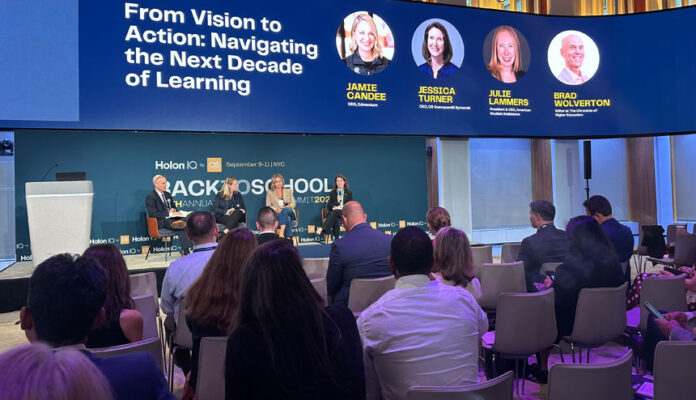IBL News | New York
The 24th Annual ‘Back to School’ Summit, hosted successfully by HolonIQ and QS September 10-11, 2025, in New York City, brought together around 500 CEO’s and influential leaders from leading companies, major institutional investors, and global foundations. Continuing a tradition started in 2001, senior education leaders met in New York the week after Labor Day to share ideas, new insights, and forge connections.
For two days, top executives participated in roundtables, fireside chats, panels, networking sessions, and networking receptions in one of the world’s leading conferences for global education.
The agenda covered topics such as the impact of AI, funding for outcomes-driven education, digital transformation in higher education, and the latest in education technology.
About the impact of artificial intelligence, Jamie Candee, CEO at Edmentum, said, “AI is not happening at scale in the U.S.,” while Julie Lammers, President and CEO of American Student Assistance, pointed out, “We need to be adaptable to uncertain times.” Julie Lammers revealed that “innovation is mostly happening in rural communities.”
During the same panel dubbed “From Vision to Action: Navigating the Next Decade of Learning,” Jessica Turner, CEO at AQ Quacquarelli Symonds, explained that the adoption will depend on “how the institutions reinvent themselves.” “Education is a social enterprise and activity, and it will be least automated.”
Regarding investments in the EdTech industry, at one of the most crowded panels on the subject, Jeffrey Silber, manager at BMO Capital Markets, highlighted that “investors are shifting from growth to profitability.”
One of the main sponsors, Western Governors University (WGU), demoed its brand new credentialing platform, mywguwallet.org.
Patrick Brothers, Co-Founder at HolonIQ & Executive Director at QS, showcased the company’s new analytics workforce platform, which includes a skills and occupations map and benchmarks nations against one another.
John Colborn, Executive Director of Apprenticeship for America, emphasized the positive outcome of the apprenticeship approach for the job seekers and the workforce alike. He notes that “entry-level workers are declining by double digits because of AI.”
On the second day of the summit, Matt Sigelman, President of The Burning Glass Institute, defended “the urgent need for lifelong learning ecosystems that support workforce transitions, re-skilling, and real-world outcomes,” especially aiming at “future-proof economies.”
As a practical approach, Sigelman said that “community colleges are the perfect scenario for innovation.”
James Moore, Director of Online Learning at DePaul University’s Driehaus College of Business and professor of Internet marketing, elaborated on the new scenario of LLMs as the new traffic generators since traditional SEO searching is increasingly less effective.
Panelists agreed on the idea of investing in skills and lifelong learning strategies to grow productivity, as skills and lifelong learning will determine the readiness of the workforce and ultimately national competitiveness.
During the event, organizers announced that the next Global Skills Week will take place on March 24 – 28, 2026, in Washington, DC.

 En Español
En Español











![OpenAI Released Apps that Work Inside ChatGPT and an SDK [Video]](https://iblnews.org/wp-content/uploads/2025/10/openaieventday-218x150.jpg)









